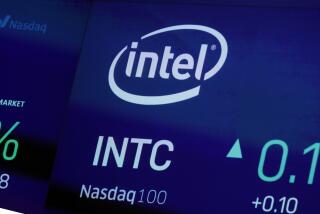Intel Will Shut 2 Oregon Plants for 10 Days
- Share via
SAN FRANCISCO — Intel Corp. said Thursday that it will temporarily close two microprocessor plants in Aloha, Ore., beginning this weekend in response to an oversupply of chips for the PC market.
None of the 1,700 employees affected will be laid off, said Intel spokesman Tom Waldrop, though most will be on enforced vacation leave during the 10-day closure. Some may be eligible for a voluntary separation program, part of a plan announced in April to reduce the company’s total labor force by 3,000, he added.
The Oregon plants produce the central brains of PCs, as well as the chip sets that support other PC functions--but not the most advanced versions of those products. Intel is gradually ramping up production of the latest chips, and reducing production of older versions.
“By itself, [the shutdown] is really not significant,” said Dean McCarron, a chip analyst with Mercury Research in Scottsdale, Ariz. In a meaningful industry downturn, chip companies cut back on product development. This has not occurred with Santa Clara-based Intel, nor with most of the other chip makers that have announced work force reductions in recent months.
“The plants involved would indicate that Intel’s oversupply situation is not out of sync with the market,” McCarron said. Those plants are relatively small facilities for Intel, the world’s largest supplier of microprocessors.
The second quarter is normally the weakest for PC sales and was particularly weak this year. And given the soft demand for microprocessors in Asia due to the financial crisis there, a temporary oversupply of Intel’s older chips is hardly surprising, McCarron said.
Intel has slowed production in response to market conditions on a number of other occasions, according to Waldrop, who contrasted the situation with previously announced permanent closings of facilities in Chandler, Ariz., and Dupont, Wash. Intel will attempt to find jobs for those workers within the company, he said.
Going forward, Intel will try to compete more effectively on two fronts where it has lost ground to competitors, analysts say. For low-cost PCs, Santa Clara-based National Semiconductor’s Cyrix subsidiary and Sunnyvale-based Advanced Micro Devices have taken sales from Intel, which was slow to produce a product for the sub-$1,000 PC market. When it did release its Celeron chip in April, the product proved inferior to less-expensive competing chips. New versions of the Celeron, due for release later this year, are expected to offer better price performance.
For the high end of the PC spectrum, Intel announced its new Xeon chips last week. The 400- megahertz version of the Xeon will sell for $1,124 to $2,836 each. Some faster versions, costing up to $4,000 each, will be released in a few weeks. Those were suddenly pulled from the Xeon lineup when a bug was discovered just before the announcement.
Intel may be able to ride Xeon to increased share in the lucrative workstation market, said Linley Gwennap, publisher of Microprocessor Report, an industry newsletter. “The fact that Xeon is fully compatible with your basic PC applications is a real plus,” he said. Intel shares lost $1.94 to close at $73.25 on Nasdaq.
More to Read
Inside the business of entertainment
The Wide Shot brings you news, analysis and insights on everything from streaming wars to production — and what it all means for the future.
You may occasionally receive promotional content from the Los Angeles Times.










